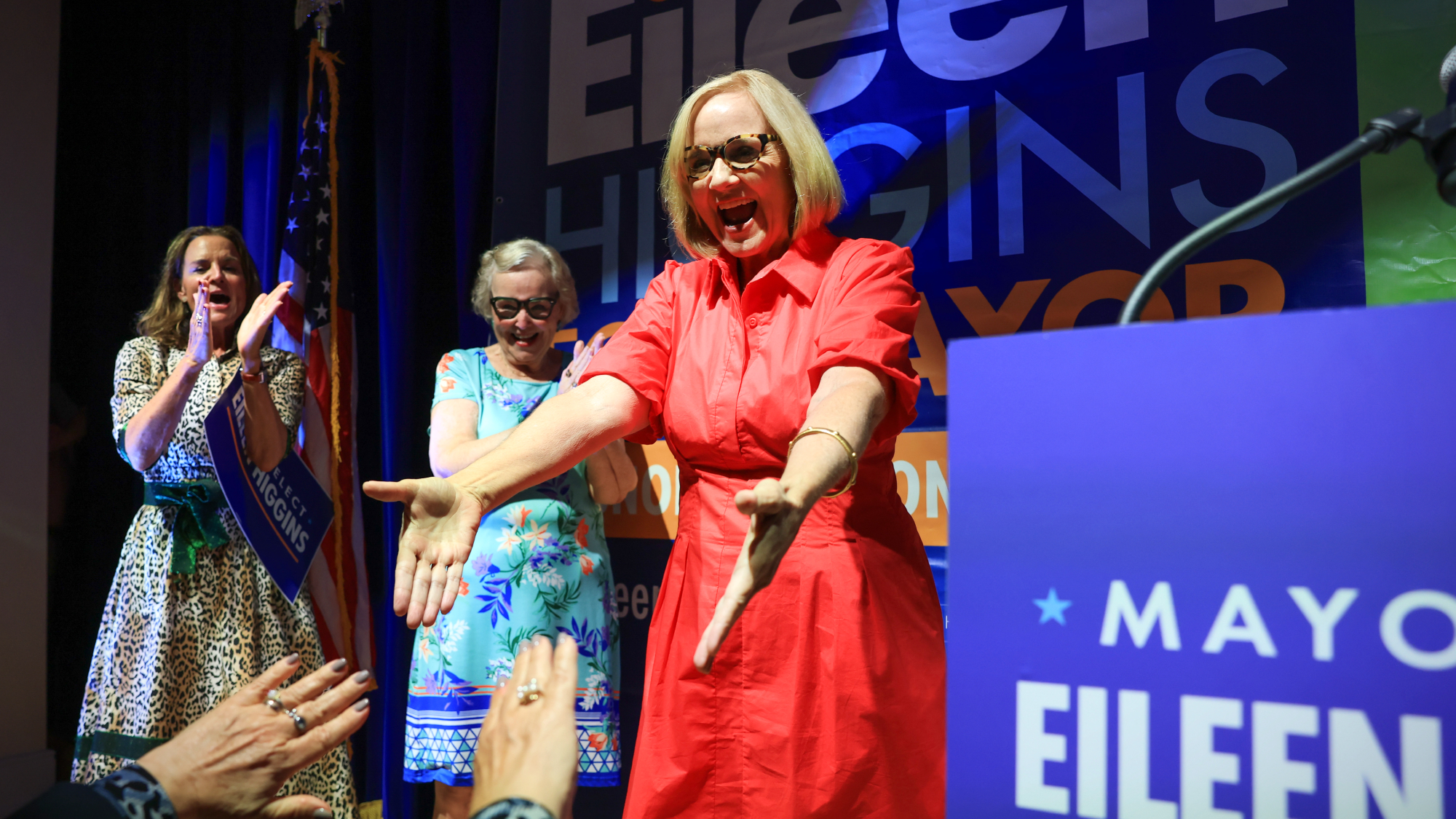Florida's Gov. Ron DeSantis vs. Disney: What happens now?
Understanding how Disney and Florida's special understanding soured


A free daily email with the biggest news stories of the day – and the best features from TheWeek.com
You are now subscribed
Your newsletter sign-up was successful
There's a battle going on between the Walt Disney Company and the government of the state of Florida and it's a little complicated. Walt Disney World is self-governing, with it's own police and fire departments and other municipal services. Gov. Ron DeSantis (R) is trying to dissolve that arrangement in retribution for Disney's opposition to Florida's new Parental Rights in Education act, or "Don't Say Gay" law, which bans or limits teaching about sexual orientation or gender identity in K-12 public schools.
So, what happens next with Disney's self-governance, and who will bear the cost?
Who is DeSantis and what is he trying to accomplish?
The Week
Escape your echo chamber. Get the facts behind the news, plus analysis from multiple perspectives.

Sign up for The Week's Free Newsletters
From our morning news briefing to a weekly Good News Newsletter, get the best of The Week delivered directly to your inbox.
From our morning news briefing to a weekly Good News Newsletter, get the best of The Week delivered directly to your inbox.
DeSantis signed a law on April 22 that will dissolve the Reedy Creek Improvement District, a roughly 40-square-mile area in Florida's Orange and Osceola counties that houses Disney World and has been governed by Disney since 1967.
DeSantis, 43, is a rising Republican star and a leading contender for the 2024 GOP presidential nomination.
His allies say trying to punish Disney World, "one of the world's most popular tourist destinations and one of Florida's biggest private employers," sends the unmistakable message that DeSantis "is not afraid of anybody, anything, or any fight," The Associated Press reports. "To critics, including some in his own party, such a raw exercise of power suggests DeSantis is operating with a sense of invincibility that could come back to haunt him," especially among independents and women voters.
What does the new legislation do?
A free daily email with the biggest news stories of the day – and the best features from TheWeek.com
The Reedy Creek Improvement District "allows Disney to essentially prop up its own government, tax itself, and use that money to provide services such as trash collection, flood control, power distribution, road maintenance, fire and emergency medical services, and water treatment," explains Washington Post travel writer Hannah Sampson. "The district also oversees its own building code and issues permits, giving Disney more control over what it builds."
The new law would take away that self-governance on June 1, 2023, Sampson explains.
Local self-governance "provides Disney with several advantages — among other things, if it wants to build a road or a new hotel, it can approve that project itself rather than going through the ordinary permitting process run by local Florida governments," Ian Millhiser writes at Vox.
How would this legislation hurt Disney?
"I think there's subtle ways in which Disney would miss its controls, would prefer to have complete control aesthetically and otherwise," Richard Foglesong, retired political science professor and author of a book on Disney, tells The Washington Post.
Instead of being able to develop and build attractions at will, "they will now have to go and ask permission," agreed Aubrey Jewett, a political science professor at the University of Central Florida. "That in itself, I think, that's going to cost more money, more time, more resources." Disney could choose to pass those costs on to customers, raising already aggressive prices at the theme park.
How would this hurt Florida?
The law "could impose a steep cost on Orange and Osceola counties," which "would inherit the Disney district's debts," notably $1 billion in bond debts, NPR explains. "Homeowners here could see property taxes jump by 20 percent to make up the difference," Danielle Prieur reports at WMFE Orlando. "And even then, it probably wouldn't be enough to cover all the money that would be lost."
"Orange County gets Reedy Creek's assets, debts, and obligations," including $58 million a year to service its debt plus $105 million to provide its services, Orange County tax collector Scott Randolph tells the Miami Herald. "Unless they want to cut services and cut spending elsewhere, they're going to have to find a way to absorb $163 million" in the county's $600 million budget.
Is DeSantis' retaliation even legal?
No, "Florida's decision to strip a government benefit from Disney because, in DeSantis's words, Disney expressed 'woke' opinions and 'tried to attack me to advance their woke agenda,' is unconstitutional," Vox's Millhiser argues. "And it's not a close case."
The law also has problems "under contracts clauses of the Florida and U.S. constitutions," but "there's a much more basic reason Florida can't dissolve Reedy Creek — it promised bond purchasers that it wouldn't," Florida attorney Jacob Schumer writes at Bloomberg Tax. "Florida simply cannot promise to prospective bondholders that it won't interfere with Reedy Creek, and then dissolve Reedy Creek. If Reedy Creek is ever dissolved, it would be a monumental and complicated enterprise even on a years-long timeline," and even then, "the dissolution will have to wait until all of its bonds are paid in full."
Disney was aware of this "and quietly sent a note to its investors to show that it was confident the legislature's attempt to dissolve the special taxing district" is "not legal," the Miami Herald reports. "The result, Disney told its investors, is that it would continue to go about business as usual."
Is this good for DeSantis anyway?
Republicans, even those who don't support DeSantis, "agree that his crackdown on Disney is a major political victory among Republican base voters already enamored by his pushback against pandemic-related public health measures over the past two years," AP reports. "They suggest it also taps into a growing Republican embrace of anti-corporate populism and parental control of education that resonates with a wider swath of voters."
DeSantis has "a combination of popularity and instincts" unrivaled in today's GOP, Florida lobbyist and Republican fundraiser Brian Ballard tells AP. "No other elected official, maybe in the country, has the Republican base support that Ron DeSantis has. So, he's incredibly powerful, not only a powerful politician, but a powerful government leader."
Given the legal uncertainties and the year-long grace period to work out an accommodation, "the whole incident might end up as little more than a showy, performative in-kind contribution from the Florida Legislature to DeSantis' incipient 2024 presidential campaign," Joel Mathis writes at The Week.
Proponents of this "no lawyers left behind" law "had some misconception that Disney's getting some special property tax break for Reedy Creek," Randolph tells the Herald. "It's not." In fact, "Disney has more power now to determine its tax bill than it did a week ago," he added. "That's what's crazy to me."
"Maybe those promoting the legislation are going to end up paying the price, not just financially but maybe with voters," Foglesong told the Post. "This could end up looking like a bailout of Disney."
Peter has worked as a news and culture writer and editor at The Week since the site's launch in 2008. He covers politics, world affairs, religion and cultural currents. His journalism career began as a copy editor at a financial newswire and has included editorial positions at The New York Times Magazine, Facts on File, and Oregon State University.
-
 What is the endgame in the DHS shutdown?
What is the endgame in the DHS shutdown?Today’s Big Question Democrats want to rein in ICE’s immigration crackdown
-
 ‘Poor time management isn’t just an inconvenience’
‘Poor time management isn’t just an inconvenience’Instant Opinion Opinion, comment and editorials of the day
-
 Bad Bunny’s Super Bowl: A win for unity
Bad Bunny’s Super Bowl: A win for unityFeature The global superstar's halftime show was a celebration for everyone to enjoy
-
 The billionaires’ wealth tax: a catastrophe for California?
The billionaires’ wealth tax: a catastrophe for California?Talking Point Peter Thiel and Larry Page preparing to change state residency
-
 What have Trump’s Mar-a-Lago summits achieved?
What have Trump’s Mar-a-Lago summits achieved?Today’s big question Zelenskyy and Netanyahu meet the president in his Palm Beach ‘Winter White House’
-
 Bari Weiss’ ‘60 Minutes’ scandal is about more than one report
Bari Weiss’ ‘60 Minutes’ scandal is about more than one reportIN THE SPOTLIGHT By blocking an approved segment on a controversial prison holding US deportees in El Salvador, the editor-in-chief of CBS News has become the main story
-
 Miami elects first Democratic mayor in 28 years
Miami elects first Democratic mayor in 28 yearsSpeed Read Eileen Higgins, Miami’s first woman mayor, focused on affordability and Trump’s immigration crackdown in her campaign
-
 Has Zohran Mamdani shown the Democrats how to win again?
Has Zohran Mamdani shown the Democrats how to win again?Today’s Big Question New York City mayoral election touted as victory for left-wing populists but moderate centrist wins elsewhere present more complex path for Democratic Party
-
 Millions turn out for anti-Trump ‘No Kings’ rallies
Millions turn out for anti-Trump ‘No Kings’ ralliesSpeed Read An estimated 7 million people participated, 2 million more than at the first ‘No Kings’ protest in June
-
 Miami Freedom Tower’s MAGA library squeeze
Miami Freedom Tower’s MAGA library squeezeTHE EXPLAINER Plans to place Donald Trump’s presidential library next to an iconic symbol of Florida’s Cuban immigrant community has South Florida divided
-
 Florida wages crosswalk war on public displays of pride
Florida wages crosswalk war on public displays of prideIN THE SPOTLIGHT Gov. Ron DeSantis' campaign comes for colorful crosswalks, as Florida residents engage in guerrilla graffiti as a form of resistance
